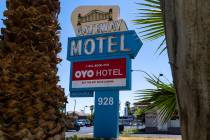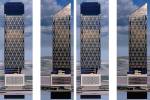Blowing whistle on a giant
Fred Frazzetta isn't a lawyer or cop. He's an unemployed electrician.
He doesn't know the law, but thinks it's just common sense that authorities should hold someone responsible for the building and fire code violations that caused more than 700 remodeled hotel rooms to be shut down recently at the Rio and Harrah's Las Vegas. Most of the rooms have since been repaired and reopened.
But now Las Vegas police may be getting interested in his take on events. Detectives from the department's criminal intelligence section spent an hour with him Nov. 27, talking about the hotel remodeling projects. The session was tape-recorded, according to Frazzetta, who blew the proverbial whistle on the hotel code infractions.
"We do not have an active investigation into allegations of corruption as they relate to Harrah's, (nor) an investigation of construction defects with respect to the hotels," Lt. Dave Logue of criminal intelligence said two days later.
The section handles public corruption cases. It recently turned over to the district attorney a file about potential financial wrongdoing at University Medical Center, a county hospital. It also helped on the bribery case involving Michael Galardi, a topless-club owner. In 2006, several Clark County commissioners were convicted in the case and are now in prison.
"What Harrah's did is criminal," Frazzetta alleged in a recent e-mail to Michael Kessler, whose firm will audit how the county handled Frazzetta's 2006 complaint about remodeling at the Rio. County commissioners approved the Kessler International contract in early November. Kessler interviewed Frazzetta on Monday about the hotel remodeling jobs.
"They not only broke the law by not pulling permits & having inspections," Frazzetta's e-mail to Kessler continues. "But they jeopardized people's lives ... for many years" in the case of any substandard work that was installed as early as 2004, but did not get corrected until fall 2007.
Required fire safety measures, such as fire-caulking, were missing at numerous locations in both the Rio and Harrah's Las Vegas, county investigators have recently documented. Fire-caulking is a method of sealing holes drilled through walls or concrete slab floor to prevent smoke or toxic fumes from seeping into other areas of a building.
Harrah's officials sidestepped a Review-Journal request for an interview on how civil or criminal liability applied to the remodeling now being corrected at two of its hotels. Instead, Senior Vice President Jan Jones issued a statement Monday:
"When recent facts came to light, we began immediately to conduct an investigation of all renovation projects" by Harrah's in Clark County. "In addition we retained an outside firm to investigate what happened, how it happened, and how to see that it does not happen again. ... Harrah's Entertainment has no higher priority than the safety of our guests and our employees."
Frazzetta is the workman who brought his concerns about uninspected remodeling at the two hotels to the Review-Journal in July.
That was only after Frazzetta -- who had worked on the Rio remodeling in 2005, and then went full-time in the maintenance department at Harrah's Las Vegas, until he was fired in June -- could not rouse an internal response from Harrah's Entertainment, which owns the properties, or from the county's building division, which monitors construction projects including large-scale commercial remodeling projects.
He filed his Rio complaint with the county in 2006. Within the company, he tried repeatedly to talk to Harrah's supervisors and higher management about his theory of improper remodeling. He also reported it to an employee hot line operated for Harrah's Entertainment by an independent company.
Then in June, Harrah's Las Vegas fired him for trying to leave after his shift with company property without written permission. In his backpack, a security guard found six light bulbs Frazzetta wanted to borrow and an undated copy of a state OSHA inspection report of Caesars Palace, another hotel-casino in the Harrah's Entertainment empire.
THE CONCEALED COMES TO LIGHT
The Review-Journal and Frazzetta researched the Rio's history of remodeling guest rooms by looking at permits, building plans and inspection reports. Then in late August the newspaper rented rooms of two types at the Rio. An independent construction consultant who visited the rooms said they deviated from the official plans on file and merited investigation.
"For all the years these remodels were sitting there, there was an increased risk of hurting somebody if there had been a fire," Frazzetta said. "People shouldn't have to cross their fingers that their hotel room (is) safe."
He likens the hazards at the Rio and Harrah's Las Vegas to the circumstances at the MGM Grand fire in 1980, which took 87 lives.
A fire-safety professional, Terry Taylor from Northern Nevada, echoes the sentiment of layman Frazzetta.
"You are putting into play exactly the same circumstances, and all you're doing is waiting for the fire," said Taylor, who has served as deputy state fire marshal in both Nevada and California. He now does independent fire investigations and is credentialed to testify on fire safety in federal and state courts in Nevada and California.
At both Harrah's Entertainment hotels now under scrutiny, county reports document multiple locations where drilled holes compromised the fire resistance of walls and concrete flooring, or where new electrical wiring was substandard. At Harrah's Las Vegas, on five floors of one guest tower, some fire dampers were either missing, blocked by debris or otherwise below standards, according to a Nov. 7 correction notice.
A key difference between now and the time of the MGM fire is that fire sprinklers are required in high-rise guest rooms.
The Rio remodeling is thought to have taken place several floors at a time, from late 2004 to early 2006. Demolition debris would have been present in Rio Dumpsters during that span, but county fire or building inspectors never picked up on the ongoing construction. During the same period, the Rio obtained building permits for remodel projects in public areas of the property and employee offices or kitchens.
On Sept. 26, the county issued its first violation notices to the Rio, just before the newspaper ran, on Oct. 3, its first account of the uninspected remodeling.
On Sept. 27, the county issued a statement that, as a result of the Review-Journal information, the building division was reopening its Rio investigation, which it had closed after a cursory inspection in February.
On Oct. 8, the hotel giant pulled 600-plus guest rooms from use at Harrah's Las Vegas to facilitate an investigation.
BLOWING THE WHISTLE
Both the county and company have promised full reports to the public once their investigations are complete. But no one is talking about civil or criminal liability.
Frazzetta has said he won't return to work, for as long as his savings last, so he can pursue the matter. Lobbying for criminal charges to be filed, he has knocked on numerous doors within the justice system since the story broke.
He went to the Clark County district attorney's office, the local office of the FBI, the state attorney general and Las Vegas police's detective bureau. Each, in effect, gave him some variation on "No, thank you."
Talk to the Clark County district attorney, staff at the Nevada attorney general's office told him by phone, after he followed up on an e-mail sent in July, Frazzetta says.
We won't do anything until a law enforcement agency presents us its investigation, Assistant District Attorney Christopher Lalli told Frazzetta in an Oct. 9 e-mail.
It's a civil matter, so the police won't get involved, Detective Darren Flatin told Frazzetta on Oct. 25.
Frazzetta hasn't heard from the FBI's Las Vegas office, which he visited on Oct. 5 without an appointment, although he says a duty agent sat down with him and took preliminary notes.
The Clark County building division said it does not penalize building owners financially for allowing undocumented or substandard construction to take place.
"Our whole focus is code compliance without being punitive," Assistant County Manager Phil Rosenquist said Oct. 3.
But in 1981, county commissioners talked tough when they tightened safety requirements for high-rises after the MGM and International fire. They wrote into county law a policy statement that the fires didn't just cause "severe loss of life and injury." The statute also reads, the fires maimed the "local economy, employment, and the image of Clark County as a safe place to visit."
WHAT LIES AHEAD?
Some legal avenues are possible, despite local agencies' silence.
The Nevada State Contractors Board has criminal investigators, who ordinarily look into reports of unlicensed contracting.
"We don't make arrests. ... We work with local law enforcement agencies" after an investigation is complete, said Art Nadler, a board spokesman.
County officials said they filed four complaints in October with the board -- three against Harrah's, a fourth against a local contractor that frequently works for Harrah's -- in connection with the remodeling scandal, though new state law forbids the board to acknowledge any pending complaints.
The Clark County Fire Department, too, has the power to issue misdemeanor or felony citations, through its fire prevention bureau. But the bureau's practice has been not to cite after inspectors find code violations, if a property owner acts quickly to comply, according to Deputy Fire Chief Girard Page.
Does the practice encourage property owners to evade the permit process, because there are no penalties associated with getting caught?
Page, who became head of fire prevention in February, said he is evaluating whether to change that practice. In the case of Harrah's, "the decision to not cite somebody has not been made," he said in late November.
The state fire marshal's office can join an investigation that requires technical, highly specialized knowledge of building fire systems or equipment, and of fire hazards. By state law, "I'm able to assist any jurisdiction with the capabilities I have, upon request," Jim Wright, state fire marshal, said in a recent phone interview. No one representing Clark County has contacted his office about the hotels, he said.
Jeff Donahue, who recently retired from his post as Las Vegas deputy fire marshal, said he generally favors pursuing even misdemeanors against fire-safety contractors who violate state fire laws, because criminal conviction can threaten their state-issued licenses as fire professionals.
State laws on fire safety allow prosecutors to seek a $1,000 fine for each day that code violations exist in a hotel, Terry Taylor noted. In his view, courts do not need to establish criminal intent to convict for violations of regulatory laws, such as those that cover hotel safety or traffic offenses. Guilty parties can be ordered to reimburse prosecution costs, he added.
REGULATORS FINED CASINO
No flames broke out at either remodeled hotel before code deficiencies were corrected. So no one knows how well or how poorly either structure would have fared in a fire. Does that mean no harm, no foul?
Ralph Englestad, founder of the Imperial Palace and now deceased, in 1989 was fined by $1.5 million by the Nevada Gaming Commission -- not for putting patrons at risk, but for damaging the state's gaming image by holding two private parties at his casino that were themed to the April 20 birthday of Adolph Hitler.
Dennis Neilander, chairman of the Nevada Gaming Control Board, said in early October the board will consider the county's eventual report and will look into the matter if "willful misconduct" occurred.
"We value the trust that our guests and communities have placed in us," concluded Jan Jones' Monday statement for Harrah's, "and we will continue to work to earn and maintain that trust."
Contact reporter Joan Whitely at jwhitely@reviewjournal.com or (702) 383-0268.























